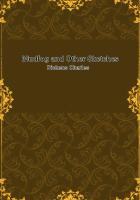"Citizen Simon has deserved much of the country, and he is one of the most faithful supporters of the one and indivisible republic," said Petion, when Doctor Naudin ended his report. "The republic must, like a grateful mother, show gratitude to her loyal sons, and care for them tenderly. So tell us, Citizen Naudin, what must be done in order to restore health to Citizen Simon and his wife."
"They are both sick from the same cause, and, therefore, they both require the same remedy. That remedy is, a change of air and a change of location. Let Simon have another post, where he shall be allowed to exercise freely out of doors, and where he shall not be compelled to breathe only the confined air of a cell; and let his wife not be forced to listen to the whining and the groaning of the little sick Capet. In one word, give to them both liberty to move around, and the free air, and they will, without any doubt, and within a short time, regain their health."
"It is true," said Petion, "the poor people lead a sad life in the Temple, and are compelled to breathe the air that the last scions of tyranny have contaminated with their poisonous breaths. We owe it to them to release them from this bad atmosphere, in consideration of their faithful and zealous service to the country. Citizen Simon has always taken pains to repair the great neglect in Capet's education, and to make the worthless boy prove some day a worthy son of the republic."
"But even if Simon should remain in the Temple, he would not be able to go on much longer with the education of the boy," said the hospital director, with a shrug.
"What do you mean by that, citizen doctor?" asked Petion, with a pleasant lighting up of his eyes.
"I mean that the boy has not a long time to live, for he is suffering at once from consumption and softening of the brain, and the latter disease will soon reduce him to an idiot, and render him incapable of receiving instruction."
"You are convinced that the son of the tyrants will not recover?" asked Petion, with a strained, eager glance.
"My careful examination of his case has convinced me that he has but a short time to live, and that he will spend the larger part of this time in an idiotic state. On this account Simon ought to be removed from the Temple, in order that his enemies may not be able to circulate a report about this zealous and worthy servant of the republic, that he is guilty of the death of little Capet--that Simon's method of bringing him up killed him. And besides, in order that the same charge should not be laid to the one and great republic, and it be accused of cruelty to a poor sick child, kindly attentions should be bestowed on him."
Petion's countenance clouded, and his eyes rested on the physician with a sinister, searching expression.
"You have a great deal of sensibility, doctor, and you appear to forget that the boy is a criminal by birth, and that the republic can have no special sympathy with him."
"For me," answered Naudin, with simplicity, "every sick person at whose bed I am called to stand, is a poor, pitiable Iranian being, and I never stop to think whether be is a criminal or not, but merely that he is a sufferer, and then I endeavor to discover the means to assist him. The hallowed and indivisible republic, however, is an altogether too magnanimous and exalted mother of all her children not to have pity on those who are reduced to idiocy, and in sore sickness. The republic is like the sun, which pours its beams even into the dungeon of the criminal, and shines upon the just and unjust alike."
"And what do you desire that the republic should do for the offspring of tyrants?" asked Petion, peevishly.
"I desire not much," answered Naudin, with a smile. "Let me be permitted to visit the sick child from time to time, and in his hopeless condition to procure him a little relief from his sufferings at least, and let him be treated like the child he is.
Let a little diversion be allowed him. If it is not possible or practicable for him to play with children of his age, let him at least have some playthings for his amusement."
"Do you demand in earnest that the republic should condescend to provide playthings for her imprisoned criminals?" asked Petion, with a scornful laugh.
"You have commanded me to visit the sick boy in the Temple, to examine his condition, and to prescribe the necessary remedies for his recovery. I can offer no hope of recovery to the patient, but I can afford him some relief from his sufferings. Some of my medicines are called playthings! It lies with you to decide whether the republic will refuse these medicines to the sick one."
"And you say that the little Capet is incurable?" asked Petion, eagerly.
"Incurable, citizen representative."
"Well, then," said Petion, with a cold smile, "the republic can afford to provide the last of the Capets with toys. They have for centuries toyed fearlessly with the happiness of the people, and the last thing which the people of France give back to the tyrants is some toy with which they may amuse themselves on the way to eternity. Citizen doctor, your demands shall be complied with. The first place which shall become vacant shall be given to Citizen Simon, that he may be released from prison and enjoy his *******.
The little Capet will be provided with playthings, and, besides, you are empowered to give him all needful remedies for his relief. It is your duty to care for the sick child until its death."















